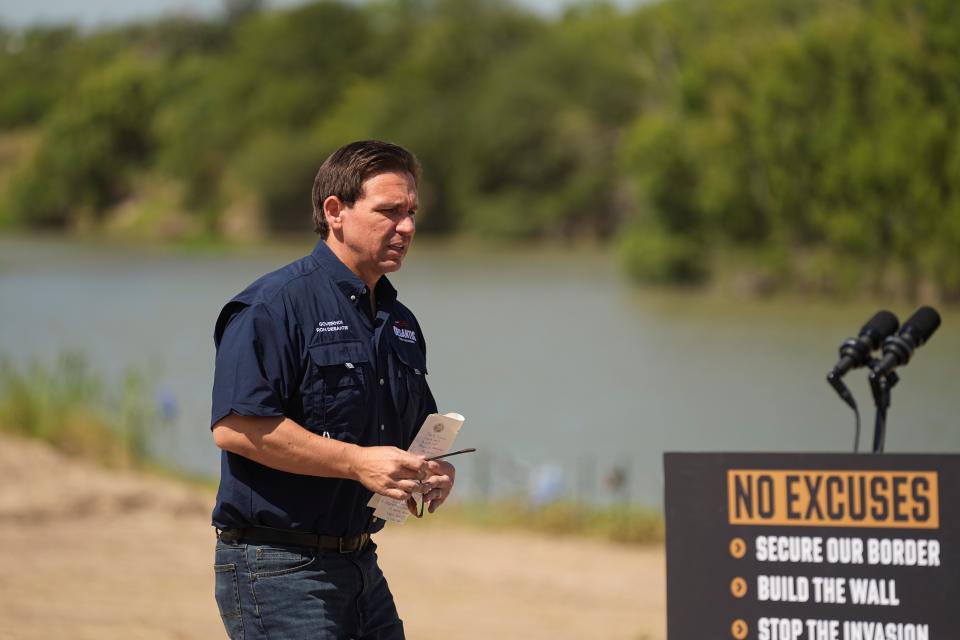Editorial: Punitive law hurts employers and immigration
- Oops!Something went wrong.Please try again later.
Editorials from The Palm Beach Post Editorial Board are the opinions of the Board, not of the Post newsroom.
Gov. Ron DeSantis recently unveiled his immigration policy to the nation. It's a pivot from his earlier anti-woke, rhetoric designed to make America more like Florida. When it comes to cracking down on immigration, voters across the country might want to take a closer look at Florida, where a new state law has created one hot mess.
Imagine fields of unpicked produce, delays in commercial and residential projects and longer waits in restaurants, all caused by staffing shortages. Right now agriculture, construction and tourism — crucial economic drivers in the Sunshine State — face a labor exodus thanks to SB 1718, a bill the Governor enthusiastically backed and signed into law. The measure has sparked fear and protest throughout the state, something neither the Governor nor Republican legislators anticipated. It may make for good right-wing politics in a presidential campaign but isn't playing well back home. In an already tight labor market, a law scaring off workers is the last thing they anyone needs.
This law "is creating incentives for people to leave Florida and find work in other states, " Samuel Vilchez, the Florida director of the American Business Immigration Coalition told USA Today Network reporters. "The consequences of those departures are going to be clear to many in the business community."

Our View: Florida suffers for years when Governor gets it wrong on purpose
Unfortunately, the man who could clean up the damage is instead doubling-down on a much bigger stage. Last week, in Texas, DeSantis proposed a series of tough new immigration policies that included building a wall across America's southern border, ending birthright citizenship, using troops for mass deportations and allowing deadly force to stop people from cutting through border structures.
“If the feds have the responsibility to do immigration, and they decide to just not do it, then are we just helpless, and we don’t have the laws enforced at all?” DeSantis asked at his press conference. “I think the states have a role to play. I can tell you as president, we’re gonna fully deputize all state and local governments to be able to enforce it.”
The reality is that the United States needs more immigrants to counter its labor shortage. There are almost 10 million open jobs but only 5.8 million unemployed workers, according to U.S. Chamber of Commerce data. DeSantis' ideas only offer a veneer of tough border enforcement. They do nothing to improve the process for persons legally awaiting citizenship, much less address the many workplace issues facing businesses — like many in Florida — that rely on migrant labor, documented and undocumented.
Florida is a state of about 1.8 million immigrants, including many who lack permanent status. Immigrants represent 11% of our labor force, but 37% of farmworkers, 23% of construction workers and 14% of service industry employees. If any state needed a thoughtful, comprehensive and bipartisan approach to immigration reform, it was Florida. But that's not what the Governor and Legislature gave us.
The immigration law that took effect yesterday imposes restrictions on undocumented residents, and employment requirements that include random audits of businesses suspected of hiring illegal workers, cutting social services for undocumented immigrants and harsher penalties for knowingly transporting or hiring those without proper paperwork. There's also $12 million in taxpayer revenue for DeSantis's controversial migrant transport program, the one he used to snatch undocumented workers from red-state Texas and dump them in blue states California and Massachusetts.
Unmet needs remain. Congress should provide manpower and resources to process asylum requests and set a clearer pathway to legalization. States also need greater flexibility to issue work permits to immigrants, to help employers fill jobs.
To date, however, Congress hasn't taken a serious look at the nation's immigration problems since the 2013 Gang of Eight attempt that included another Florida presidential hopeful, Sen. Marco Rubio.
A more comprehensive approach is needed. Sadly that's not the Florida way, nor America's, at the moment.
This article originally appeared on Palm Beach Post: Florida immigration hurts business and immigration reform

